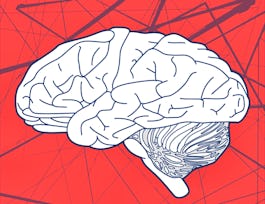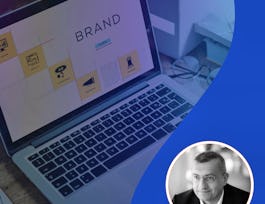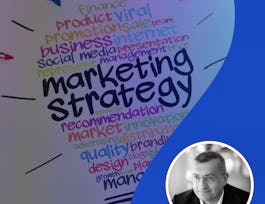How do we make decisions as consumers? What do we pay attention to, and how do our initial responses predict our final choices? To what extent are these processes unconscious and cannot be reflected in overt reports? This course will provide you with an introduction to some of the most basic methods in the emerging fields of consumer neuroscience and neuromarketing. You will learn about the methods employed and what they mean. You will learn about the basic brain mechanisms in consumer choice, and how to stay updated on these topics. The course will give an overview of the current and future uses of neuroscience in business.


An Introduction to Consumer Neuroscience & Neuromarketing
Taught in English
Some content may not be translated
182,040 already enrolled
(3,168 reviews)
Skills you'll gain
Details to know

Add to your LinkedIn profile
5 quizzes
See how employees at top companies are mastering in-demand skills


Earn a career certificate
Add this credential to your LinkedIn profile, resume, or CV
Share it on social media and in your performance review

There are 6 modules in this course
We first need to define the field – what are the key concepts, what are the key methods and reasons for employing neuroscience to study consumers and communication effects? In this module, we will introduce the topic and how some specific studies provide key insights into what neuroscience has to offer in relationship with more traditional methods.
What's included
4 videos2 readings1 quiz
In the second module of this course we are turning to the functions of the brain, and we will first focus on attention and consciousness. This module will focus on some key concepts in attention and consciousness.
What's included
4 videos1 reading1 quiz
In this module we will have contents filled on the topic of sensory neuromarketing. How are our senses affected differently as consumers? What can you do to organise your communications to better use all the senses? How does the brain actually use the senses? What tools do we have for assessing the use of senses, and how they affect consumers?
What's included
5 videos1 reading1 quiz
In this module, everything is about emotions and feelings, and the relationship between emotions and preference. As we will see, our minds have a dual side: a conscious and an unconscious response and motivation, which are crucial to understanding consumer preference and choice. Indeed, unconscious emotional responses may turn out to be driving consumer choice to the same - or even larger - degree than conscious feelings. Are conscious feelings a mere after-the-fact rationalization upon conscious choice?
What's included
4 videos1 reading1 quiz
This module will focus on Learning & Memory. We will determine not only that there are multiple kinds of memory, but that they also serve multiple purposes. If anything, learning is the vehicle we need to understand the most in consumer behaviour. What causes memory, and can we be affected unconsciously by our memories? How can we measure memory effects, and what is the relationship between brand equity and the brain? This module, we also have an interview with Prof. Richard Silberstein, who shares his view on neuromarketing and consumer neuroscience. Prof. Silberstein is the Founder and chairman of the neuromarketing company Neuro-Insight (http://www.neuro-insight.com/).
What's included
3 videos1 reading1 quiz
This module, we will focus on both the ethics of neuromarketing, as well as aberrant consumer behaviours. We see that consumer choice can sometimes become the centre focus on a person's life, be it pathological gambling, "shopaholism" or digital dependencies. This module, we will focus on some of these issues, and combine them with the ethical aspects that we face when talking neuro. This module we also end off with two interviews: one with Prof. Jan Trzaskowksi at the CBS, who is working on marketing and the law, where we discuss what the ethical and legal aspects of neuromarketing is. As you will see, Jan has a very particular take on this that I am sure you will find interesting. Our second interview is with Carl Marci, who is the Co-Founder and Chief Science Officer of Innerscope Research (http://innerscoperesearch.com/) on his background and their take on neuromarketing and consumer neuroscience.
What's included
4 videos1 reading1 peer review
Instructor

Offered by
Recommended if you're interested in Leadership and Management

Copenhagen Business School

University of London

Coursera Instructor Network

Coursera Instructor Network
Why people choose Coursera for their career




Learner reviews
Showing 3 of 3168
3,168 reviews
- 5 stars
74.44%
- 4 stars
20.26%
- 3 stars
3.52%
- 2 stars
1.10%
- 1 star
0.66%
New to Leadership and Management? Start here.

Open new doors with Coursera Plus
Unlimited access to 7,000+ world-class courses, hands-on projects, and job-ready certificate programs - all included in your subscription
Advance your career with an online degree
Earn a degree from world-class universities - 100% online
Join over 3,400 global companies that choose Coursera for Business
Upskill your employees to excel in the digital economy
Frequently asked questions
Access to lectures and assignments depends on your type of enrollment. If you take a course in audit mode, you will be able to see most course materials for free. To access graded assignments and to earn a Certificate, you will need to purchase the Certificate experience, during or after your audit. If you don't see the audit option:
The course may not offer an audit option. You can try a Free Trial instead, or apply for Financial Aid.
The course may offer 'Full Course, No Certificate' instead. This option lets you see all course materials, submit required assessments, and get a final grade. This also means that you will not be able to purchase a Certificate experience.
When you purchase a Certificate you get access to all course materials, including graded assignments. Upon completing the course, your electronic Certificate will be added to your Accomplishments page - from there, you can print your Certificate or add it to your LinkedIn profile. If you only want to read and view the course content, you can audit the course for free.
You will be eligible for a full refund until two weeks after your payment date, or (for courses that have just launched) until two weeks after the first session of the course begins, whichever is later. You cannot receive a refund once you’ve earned a Course Certificate, even if you complete the course within the two-week refund period. See our full refund policy.


